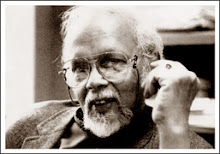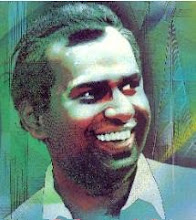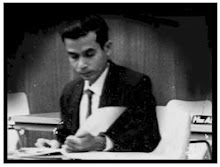Author: Prof. K. N. O. Dharmadasa
Source: Virtual Library
The ancients called theatre Drushya Kavya, "visible poetry." What appears on stage in audiovisual form, dialogue, music, gestures, costumes and stage d`E9cor, all contribute to elevate the mind just as good poetry does. Jayalath Manoratne, the village boy from Hanguranketa, when he stepped into the Peradeniya University some thirty years ago most probably knew this adage. But the full meaning of Drushya Kavya would have seeped into him as he went through a long tutelage under Sarchchandra, playing the lead role in two of the master’s most memorable plays, Pemato Jayati Soko and Vessantara.
These two plays in particular, have a somber and poignant quality to bring out, to which Manoratne contributed in no small measure in the way he portrayed the leading roles, for, as theatre goers know, the writer and producer contribute only part of what a character would be, what the character will leave behind in the memory of the Rasikas will be what has been contributed by the actor. Sarachchandra had the knack to pick out the correct actor to play a specific role and his choice of Manoratne as Uddala (the ageing teacher whose love affair with the beauty Swarnatilaka ends in tragedy) and as Vessantara (the patriarchal monarch torn between the love for his children and the love for his people) was no accident. Since those formative years, Manoratne has matured, written, directed and acted in his own plays, and, if we take his contribution to Sinhala theatre he has been an outstanding figure among the products of Peradeniya.
While joining the galaxy of great alumni in this field such as Gunasena Galappatti, Dayananda Gunawardene, and Bandula Jayawardene he has the unique distinction of being an exceptionally great actor himself. The singular feature of his achievements is his versatility: He can, with the same flair, play tragic as well as comic roles.
It also needs be added that Manoratne’s talents have not been confined to theatre alone. He has written poetry and fiction in addition to writing and directing plays. It was undoubtedly the poet in Manoratne that prompted him to see in the poetic creations of Mahagama Sekera the superb potential to be transformed into theatre. In his comparatively short life of forty eight years Sekera brought out a series of highly memorable lyrics and several long poems, in addition to works of fiction, plays, a film and a number of paintings. Among his poetic creations, four poems stand out as embodying his vision as thinker and social commentator. They are, Mak Nisada Yat (1964), Raj Rajatilaka, Lionel Saha Priyantha (1967), Bodima (1970), Nomiyemi (1973) and his last work Prabuddha (written in 1976 and published in 1977).
These works spanning a period of twelve years depict Sekara’s sensitive observation of the sociocultural transformation that was taking place around him. And if we are to take proper note of what he had to say the social disintegration and cultural degradation in modern times had already started when he was writing. Although the "open economy" had not been introduced and the ethnic riots of 1983 had not come about and the fratricide of 1988-89 was yet to come, Sekara as poet existing at the most sensitive point of the society’s conscience seems to have had an inkling of what was to follow.
Who is this man Sekara? The kind of man he was, comes out beautifully in the introductory lines of his last work, Prabuddha (I translate):
Placing a soft white paper
Upon a large elegantly polished table
Using the pointed end of a Parker pen
I have no poem to write.
Returning home with you
In a train brimming with people
Picking an empty cigarette packet
Using a short piece of pencil
I have a poem to scratch.
Those of us who knew Sekara personally are aware that this is no mere posturing. It is true to the very letter of the word. Sekera was such a simple and unassuming man that many people who travelled with him daily from Gampaha to Fort did not know that they were (literally) rubbing shoulders with a great artist. The parallel with Mano is striking. Those who know Manoratne will vouch for the fact that self-effacing humility is his hallmark.
Obviously two similar artistic personalities have come together in Lokaya Thani Yayak (The World Is One Expanse) which came on stage on the 22nd of December at the Lumbini Theatre.
Manoratne begins the Ranga Patrikava introducing the Lokaya Tani Yayak with the above quotation whose concluding lines are as follows
Even then brothers!
That poem I am writing verily about you
To many among you, I know
Will not be of meaning today.
Some day sometime in the future
When the world will be more salutary than now
You will read it, I also know
With much more affection than today.
Hope springs eternal in the mind which looks at life with kindness and concern, as very often happens in the case of poets and other artists. There are enough things to despair in the world and the artist will turn his critical eye often exposing things which others have passed by.
The true artist, however, will not stop at that. He will not merely expose and leave with a cynical smile. He will try to suggest ways and means whereby a better social order can be molded and thus give humankind some hope to live by. Manoratne has added as a response to his fellow artist the following lines, which again while being in the authentic Manoratne style are also reminiscent of the style of Sekera: (I translate again)
The world has not become salutary in any way
Except for the increasing of malevolence alone
But beloved poet! the poem you write
Is much in need today than on the day you were writing.
The message Manoratne wants conveyed is clear. We living today have to sit back and take a long look at what Sekara wrote decades ago. Engulfed are we in the midst of an economic rat race, a disintegration of values and cultural norms and an ever growing ethnic strife, will benefit collectively if we remind ourselves of some lines Sekara penned as if prophetically:
The initial step in molding a transcendent society
Is building a world satiated with
Food, drink, apparel, ornament
And dwelling.
Once satiated of those will he realize
That real satisfaction is not that.
Lokaya Tani Yayak, taking this clue from Sekera depicts as its central theme the story of the heiress Yasoda, who squanders all her wealth in the pursuit of sensual pleasure. Basically, she is not a bad woman. She was once in love with Prabuddha who refused to join the consumerist world she was in. Being a weak character Yasoda fell an easy prey to the social mores of her times.
The above lines uttered by Parbuddha many years later, when he meets the broken down and decrepit Yasoda — who had all the "food, drink, apparel" etc. one can dream of, provide us with the clue to what real happiness and real satisfaction is.
All of us have heard the oft quoted words of Sekara "Pasak kalaa mama tavat satyayak. Saagatayen pelena tenaka vagaa novana bava Dharmaya"
(I came to realize another truth. That is, that Dharmaya will not come to fruition in a place oppressed by famine).
And those words come just before he comes out with the above quoted adage that satisfaction with the material needs of existence will not in itself bring real happiness and real satisfaction.
Then what is it that brings about happiness and full satisfaction in life? Continues Sekera emphasizing the importance of spiritual development:
Once he has taken that step
Man will not do sinful actions
He will not hate
He will not be angry
The whole world will be a receptacle to his loving kindness.
Once man has achieved material wealth he has to realize that such satiation alone will not bring happiness and he will have to turn to spiritual development is the message Sekara wants conveyed. Unfortunately, however, many of those who quote Sekara’s words on the needs to fulfil man’s material needs stop there. That, we should all agree, is being very unfair by the poet. It is to the credit of Manoratne that he has brought out the full essence of Sekara’s text and his message in his Lokaya Tani Yayak.
The coming together of Sekara and Manoratne in this theatrical creation is a highly rewarding experience for the Rasikas, for, it was very often the same people who enjoyed the work of each of these artistes separately. And now we have the unique situation of Manoratne bringing Sekara on stage. Who else, other than Manoratne, could have empathized with Sekara to give visual interpretation to the texture of his verbal compositions? And what better choice as actor to bring out the subtleties of feeling in the words of Sekara with candor and self-restraint than Mano himself?
In his production, Manoratne has drawn characters from Sekara’s Bodima, as well as Nomiyemi to embellish the message embodied in Prabuddha. The prologue with Soysa, Helena and others is an introduction to the trials and tribulations poets have to undergo in the society of today. And, the episode with Ramani and Yavdiv (lifelong or eternal) Silva depict the absolute power of money in the present day social milieu. These episodes prepare the ground for the drama of Prabuddha and Yasoda to unravel on stage.
In this production Manoratne has been supported by several talented artistes. The stage sets (of Dharmapriya Dias), particularly the elevated gallery with the functional purpose of adding emphasis to certain characters and episodes, are highly effective. The music by Navaratna Gamage, gesture compositions by Ravibandhu Vidyapati and costumes by Swineeta Perera blend together beautifully. What I found most satisfying as a theatre lover is Manoratne’s discovery of an assemblage of new talent, both male and female, in this production. Let us hope that they will carry the torch and keep alive the tradition so painstakingly built up by the former masters.
While drawing on the essence of Sekara’s poetic meditation on modern society Manoratne has brought in his dramatic expertise to bring on stage what he has termed a Ranga Kavyaya (theatre poem). Personally, I would prefer it to be enjoyed in the manner it is presented and not in the conventional mode replete with dramatic happenings. Sekara’s contemplations on what was going on around him and his sensitive explorations into the human psyche have to be meditated upon. That is the only way we can do justice to his poetry.
Sunday, 31 January 2010
Subscribe to:
Post Comments (Atom)




































No comments:
Post a Comment